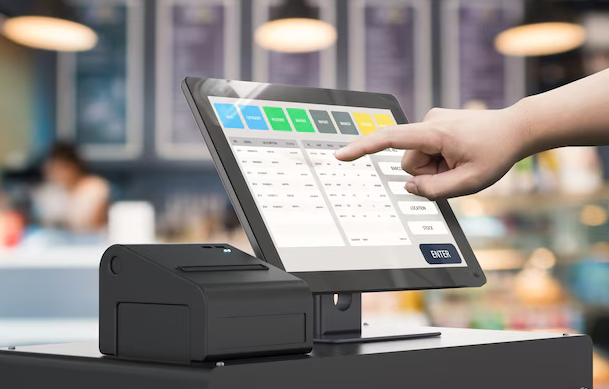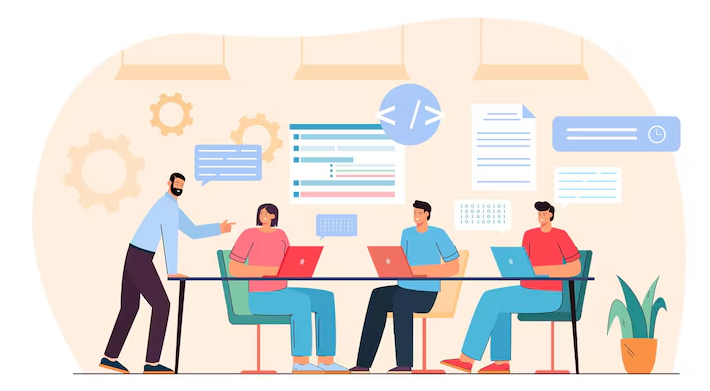POS stands for Point of Sale and is much more than a payment processing tool—It is the nerve center of the sales operation. It deals with sensitive customer data, financial transactions, every second around the clock. However, with the increase in cyber threats, data breaches, and new compliance regulations, one question, in particular, has become more important than ever: How secure is your POS system?
With the rise of cloud-based solutions and mobile payments, the level of convenience increases without any compromise on the level of risk. With digital transformation, businesses also need to secure their hygienic POS against some harsh data protection standards — PCI DSS (Payment Card Industry Data Security Standard) in particular. Compliance is not just a nice-to-have anymore — it is a business imperative as the foundation of trust, legality, and brand.
Understanding PCI DSS Compliance
What Is PCI DSS?
What is the Payment Card Industry Data Security Standard (PCI DSS)? The Payment Card Industry Data Security Standard (PCI DSS) is a globally accepted security framework created by large card networks such as Visa, Mastercard, and American Express. The PCI DSS has a rather straightforward yet significant function: to make certain that all organizations that handle, process, or store cardholder data have a securely managed environment.
In the case of POS systems, adherence consists of a series of technical and organizational protections to prevent unauthorized access, fraud, or the abuse of data. PCI DSS applies to you regardless of the size of your storefront — whether you have a single small retail store or a network of franchise locations, if you take payments via card, PCI DSS regulations apply.
Importance of PCI Compliance for POS Systems
One security breach can cost a business way more than just money; it can have a cataclysmic effect on customer trust. Users assume that the system guarding them is trusted when they share their payment details. If you do not comply with PCI DSS, you can face significant fines, lawsuits, and loss of processing rights.
Apart from economic penalties, the long-term brand adversities backfire. Today's customers know well about the threat of cybersecurity, and companies that show they are compliant in advance are likely to keep customers becoming loyal users.
POS Systems — Key Security Vulnerabilities
Data Theft and Malware Attacks
This is why POS systems become attractive targets for cybercriminals, since they are positioned directly between the consumer and the financial network. On the one hand, malware infections can silently gain access to payment card details, and on the other hand, phishing or compromised credentials can create a rotten door for unauthorized access.
Many of the large retail breaches over the past 10 years can be attributed to running old POS software or unpatched vulnerabilities. Find battle bots will seize on the weaknesses, so this may be believed to show how, without leaving a security hole, it only takes one, and even the biggest retailer will succumb to millions of credit card numbers.
Also read: Cloud vs On-Premise POS
Unsecured Network Connections
Most POS are dialing over Wi-Fi or a sniffed device. Without proper encryption or segmentation on these links, hackers have the ability to intercept sensitive data during transmission. This is further aggravated if public or shared networks are in use, making secure network design and VPN tunneling imperative for modern POS security.
Human Error and Insider Threats
Security breaches aren’t always external. In fact, even a bigger reason for a data breach is the employees who mismanage the data, share passwords, or use unauthorized USB drives, which could totally expose the entire system unintentionally. Malicious and accidental insider threats are one of the most underestimated vulnerabilities affecting retail and hospitality POS environments.
Understanding the Importance of Encryption in Protecting Data
Encryption is a crucial element of any kind of secure POS solution. Encryption turns cardholder information into unreadable code, so that even if data is intercepted during the transmission process, it will be useless, as access to the decryption keys will be required to read it.
Today, two important layers of encryption are used in modern POS systems, namely end-to-end encryption (E2EE) and tokenization. E2EE will let you keep the data protected from the time it gets swiped or tapped over till the point it reaches the payment processor. In tokenization, for high-value card numbers, they are tokenized to their replacement random numbers that have no real value, so no way they can be used to hack.
Put together, these tactics form a defense that retains the same elements of exposure and, therefore, drastically reduces the risk of a breach.
And here is the way in which Security is taken care of by Cloud POS Systems
While cloud POS platforms offer scalability and ease of use, many businesses still wonder about their safety. The truth is that when done right, cloud-based POS software can actually be more secure than traditional on-premise systems.
Cloud providers spend immense resources on encryption, detecting any breaches, and constant monitoring. Your data is saved on secure servers that are distributed in multiple locations with automatic backup and disaster recovery. The most important thing is that updates and patches are applied from the center, closing off vulnerabilities faster than any manual systems ever could.
But The Provider Is Not Off The Hook Either. This means having strong passwords, limited access rights, and staff training on the safe management of customer information.
What On-Premise POSs Do Better In Terms Of Security
Traditional on-premise systems leave every security responsibility to the business. Though this creates complete control over the resources for the company, it also places the company at a larger risk at the same time, if the required maintenance is not carried out regularly. Everything—firewalls, antivirus—must be managed by hand.
Attackers can take advantage of these vulnerabilities if a security patch is missed or a server is misconfigured. Also, it is important that the physical security of the data stored locally is maintained. You could face an unrecoverable data loss due to theft or hardware damage.
As such, many businesses are avoiding any purely on-premise POS setup unless they have a solid IT department in place that can handle maintaining whatever security posture is needed.
Compliance Best Practices for Businesses
Regular Audits and Vulnerability Testing
Compliance is not a one-time event but a process. Regular vulnerability assessments, penetration tests, and security audits are imperative for businesses, however. It unearths the bugs before they turn into a threat.
A more formal validation of your compliance status is an annual PCI DSS assessment by a qualified security assessor. This will keep your business legally protected and has the added benefit of earning the trust of banks and payment providers.
Employee Training and Access Control
When it comes to cybersecurity, human error is still one of the weakest links. Simple human training on how to identify phishing attempts, best practices for password hygiene, and access control policies can mitigate risk significantly.
With role-based access implemented, Employees will only be able to view or change the Data that is related to their job responsibilities. Such reduces exposure to susceptible data and avoids accidental leakage.
Timely Software Updates and Patch Management
Old software is an easy target for a hacker. Ensure POS Software and Payments are Up-to-Date. Businesses should make sure that all POS systems are always on their latest, secure versions — firmware, operating system, and integrations. This is an area where cloud-based systems have the upper hand because, if needed, the provider will automatically perform updates.
The Cost of Non-Compliance
Depending on the scope of the breach, the financial costs of PCI DSS violations can range from thousands to millions of dollars. Yet the costs associated with losing customers, reputational damage, and operational downtime can be way worse.
Customers expect accountability in the digital age. Knowing how things are being done to reduce these risks and how data is being protected becomes a marketing advantage based on transparency. Trust is both built and maintained faster by brands that prioritize cybersecurity as an investment.
What Makes Idea2App A Preferred Provider of Secure POS Development for Businesses
At Idea2App, we offer POS software that has security and compliance built in, not bolted on. We integrate PCI DSS standards from the stage of application design, ensuring data protection in every transaction.
Our encryption protocols are layered, we rely on tokenization for breaking paralyzing forms of data, and we design API architectures to remove as many avenues of vulnerability as possible. We are using enterprise-grade hosting environments with fine-grained monitoring and access control for cloud POS solutions.
The same experts also support our clients during their compliance certifications, prepare them for audits, and enable integration with reliable payment gateways. From a retail POS or restaurant billing to enterprise-grade multi-location setups, Idea2App shakes hands with security-first POS development, tailored to performance, compliance, and trust.
Conclusion: Building Trust Through Compliance
Security is not just a new feature, but is the foundation identifier of customer confidence. In an environment wherein cyberattacks are becoming increasingly sophisticated, organisations that treat compliance and data protection as an opportunity rather than an obligation will enjoy the winning edge.
With a PCI DSS-compliant POS, not only do you protect the transactions, you protect the reputation of your brand as well. Ensuring security, compliance, and trust for customer data deployed on the cloud or on-premises has not changed; it continues to be the biggest hurdle for any deployment option.
You have a POS software developmentpartner who understands the technology space and the regulatory landscape with Idea2App. Together, we create a POS platform commercially providing our customers speed, usability, and security by default.






